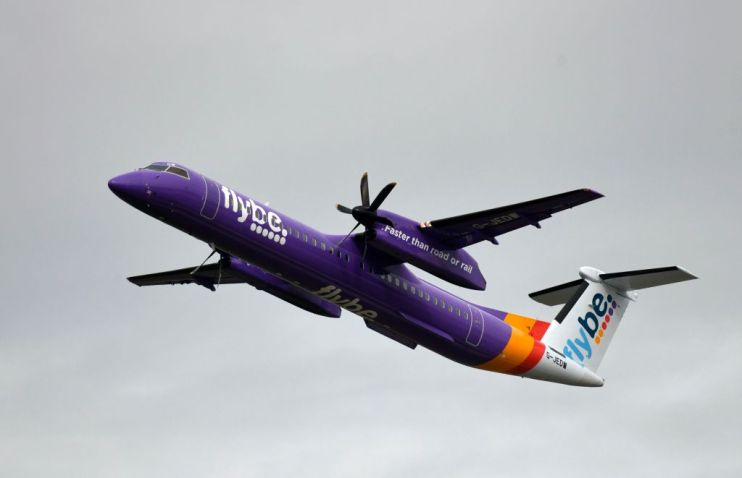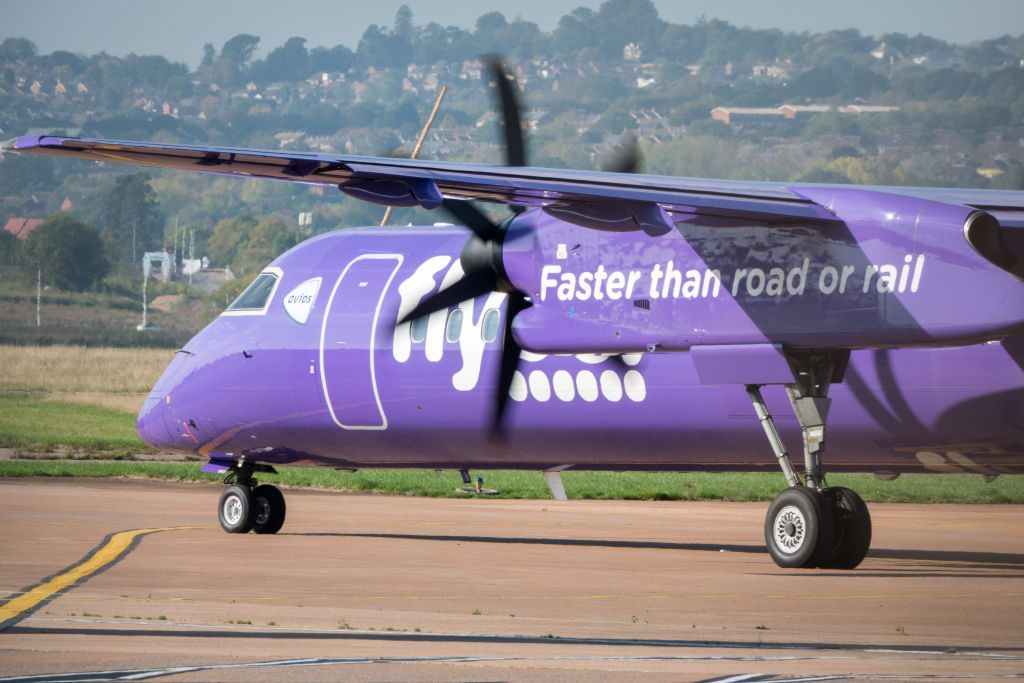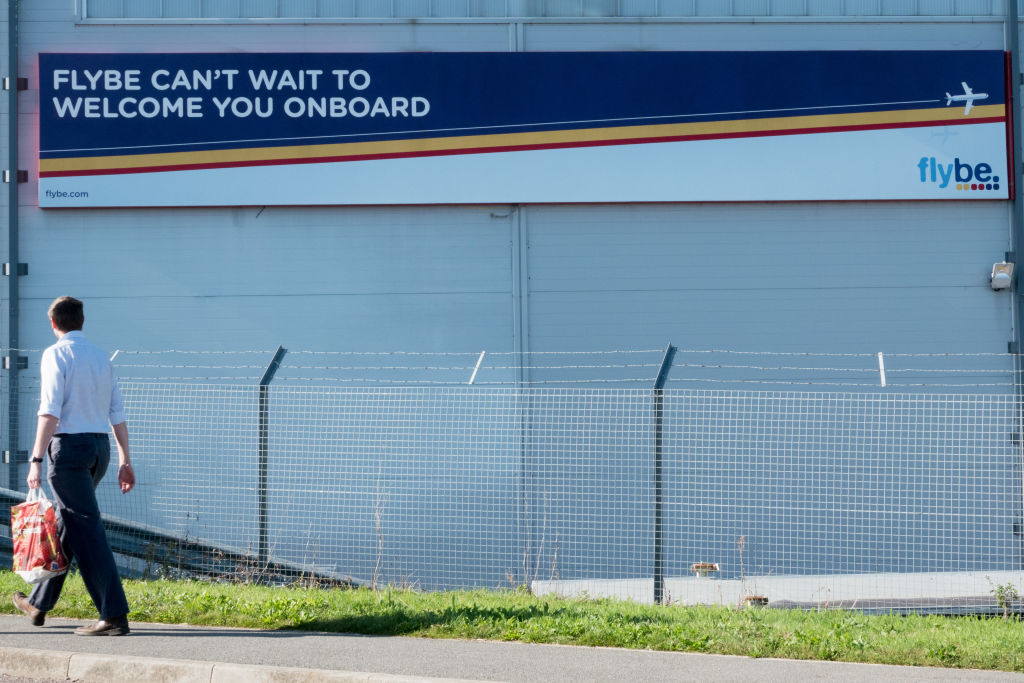Flybe ‘near collapse’: What do we know so far?

Flybe, the biggest regional airline in Europe, is said to be on the brink of collapse.
Sky News reports the carrier is engaged in a frantic bid for emergency funding, and the government is also said to be involved in the talks – which come just four months after Thomas Cook went bust in late September.
Neither party is offering any meaningful comment on the situation – so here are some of the key questions and answers as the airline fights to stay aloft.
Read more: Hays Travel to buy 555 Thomas Cook stores, in lifeline for workers
What happened?
Less than a year after it was bought out by Virgin Atlantic, Flybe is in trouble again, with reports suggesting it is making heavy losses and looking for a cash injection to keep it aloft until the peak summer season.
Big Four auditor EY is said to have been put on notice to handle an administration process, which would put more than 2,000 jobs at risk.
Sources have suggested that the government was briefed on the situation in the last few days, one adding that the discussions included whether it might facilitate emergency funding.
The news follows the collapse of Thomas Cook in September, in a sign that the airline sector continues to struggle under the weight of an industry price war and rising costs.
Where does Flybe sit in the aviation industry?
After starting out in 1979 as Jersey European Airways, the airline rebranded in 2002 as Flybe.
Today, it operates 189 routes in the UK and Europe, with a firm grip on the British regional flight market.
The majority of UK domestic flights that do not include a London airport are operated by the airline – and it has the highest number of flights at Aberdeen, Birmingham, Glasgow, Manchester and Southampton airports. It also flies to Amsterdam, Dusseldorf and Paris.
However, Flybe only carries around 8m passengers a year. Compared to a major short haul carrier like Easyjet, which carries 96.1m a year, this is tiny.

Hasn’t Flybe already been rescued?
Yes – less than a year ago. After the airline put itself up for sale in 2018, a group comprising Virgin Atlantic, Stobart Group and US hedge fund Cyrus Capital bought it in March 2019.
Read more: Flybe shareholders approve airline sale to Virgin-led consortium
The consortium paid £2.8m for Flybe’s operations and another £2.2m for the parent company, and vowed to rebrand the airline as Virgin Connect in 2020.
The group also said it would pour an extra £100m into making the regional carrier profitable again, and brought in a new strategy of moving away from leisure routes and focusing on family and business travel.
It also removed the least cost-efficient aircraft from the fleet, and announced a number of new routes.
Burgess added that this seemed “sensible,” but it appears that it has not done the trick.
Since the buyout, neither Virgin nor Flybe has released financial results for the brand.
However, Virgin Atlantic chief executive Shai Weiss told City A.M. in October that turning the struggling company around, and to “keep Flybe flying”, was still a priority.
Read more: Thomas Cook bosses point finger at government as MPs slam high pay
So what went wrong?
What didn’t?
Flybe has taken a serious hit from the falling value of the pound since the 2016 Brexit referendum. This is because a high proportion of its costs are in dollars, while most of its earnings are in sterling.
Similarly, the period of uncertainty that has struck the travel industry since the referendum has softened demand for travel in recent years.
Moreover, Flybe’s competitors have pushed it to the side in many of its traditional strongholds. It has already suffered in Bristol, where Easyjet has established itself as the major presence flying to Belfast, Edinburgh and Glasgow.
Easyjet also recently said it would start operating flights from Birmingham to Edinburgh and Glasgow – another major route for Flybe.
And as Virgin Atlantic boss Weiss told City A.M. in October: “Most of [Flybe’s] major competition in the UK is actually trains and buses.” With air passenger duty costing £26 a head before the ticket price, many people prefer not to fly within the UK – opting to take the train.

Didn’t the buyers see this coming?
Possibly – but they may have underestimated the problems. Demand has been especially poor this winter, and Flybe’s issues have worsened with the improvement of several rail networks which have brought in new timetables in recent months such as Great Western Railway.
Insiders have also said Flybe’s proposed financing requirements to become Virgin Connect have become more onerous.
Who could a Flybe collapse affect?
Some reports suggest as many as 2,000 jobs would be at risk if Flybe collapses – the airline’s website says it has 2,400 employees.
The British Airline Pilots Association this morning reacted angrily to the news about the “secret” talks, saying the union had not been consulted.
General secretary, Brian Strutton said: “I am appalled that once again the future of a major UK airline and hundreds of jobs is being discussed in secret with no input from employees or their representatives.
“According to reports the airline could have collapsed over the weekend which would have been devastating news.
Read more: Thomas Cook went bust with liabilities of £9bn
What if I have a Flybe ticket booked?
Flybe has so far insisted that it is business as usual this morning – this is what it is saying on Twitter.
And according to its live arrivals and departure board, flights are still operating as normal. Keep up to date here.
If the airline were to go into administration, however, things would become less clear cut.
When Thomas Cook went bust in September, the government was forced to recruit other major airlines to replace the cancelled flights – bringing 150,000 stranded holidaymakers home to the UK in the process.
Rob Burgess, editor of frequent flyer website headforpoints.com, adds that on routes operated under public service obligations, such as Newquay to London, the government would need to get another airline to “step in immediately”. He suggests Flybe competitor Loganair could help.
But if standard procedure protocol is followed, other passengers will not be able to get their flights, with all bookings cancelled without being transferred to another airline.
What about compensation?
Passengers who booked tickets from Flybe are not ATOL protected, meaning that tickets would most likely not be refundable. However, separate travel agents often include ATOL protection, which is designed to insure against airline failures.
Meanwhile, some travel insurance companies cover cancelled flights in the event of an airline’s collapse – but not all. Passengers are covered if the policy includes Scheduled Airline Failure Insurance (SAFI) or End Supplier Failure.
Meanwhile, passengers are also likely to be covered if they paid for their flight with a credit card and it cost more than £100.
What are people saying?
Steve Double, Tory MP for Newquay, where Flybe is a major operator, said it was “very concerning”.
“I will be seeking more information this morning and discuss this with the Minister to see what can be done. Flybe is essential to Cornwall and many regional airports,” he said.
Nigel Frith, a senior market analyst at Ask Traders, said: “Flybe is lining up to be the latest victim of an increasingly challenging industry, as the regional airline carrier stares down the barrel to potential administration.
“As one of the UK’s best-known airline brands, news that it is on the brink of collapse shows just how tough conditions are amid rising costs, currency fluctuations, increased competition, lingering uncertainty related to Brexit and a less confident consumer.
“Winter is typically a difficult time for airlines and this winter looks to be a particularly harsh one for Flybe.”
Trade union Unite said it was important the government stepped in if it is called upon.
Assistant general secretary Diana Holland said: “The speculation about Flybe’s future is deeply unhelpful and incredibly unsettling for the company’s loyal workforce.
“Unite is now seeking an urgent meeting with the company to fully understand the challenges Flybe is facing.
“Unite is committed to helping ensure the future of the company and to preserve jobs but this can’t be achieved if the union is kept in the dark.
“It is essential that the government plays an active role in helping to ensure that Flybe continues to operate. It is not acceptable for the government simply to prepare for failure.
“The government must demonstrate that it has learnt the lessons from the collapse of Monarch, which it failed to apply during the collapse of Thomas Cook.
Read more: Thomas Cook collapse: Assets under the hammer as liquidators move in
“The government must implement both the Airline Insolvency Review and the Insolvency and Corporate Governance Review at the earliest possible opportunity. It has previously committed to do so, but actions speak far louder than words.”